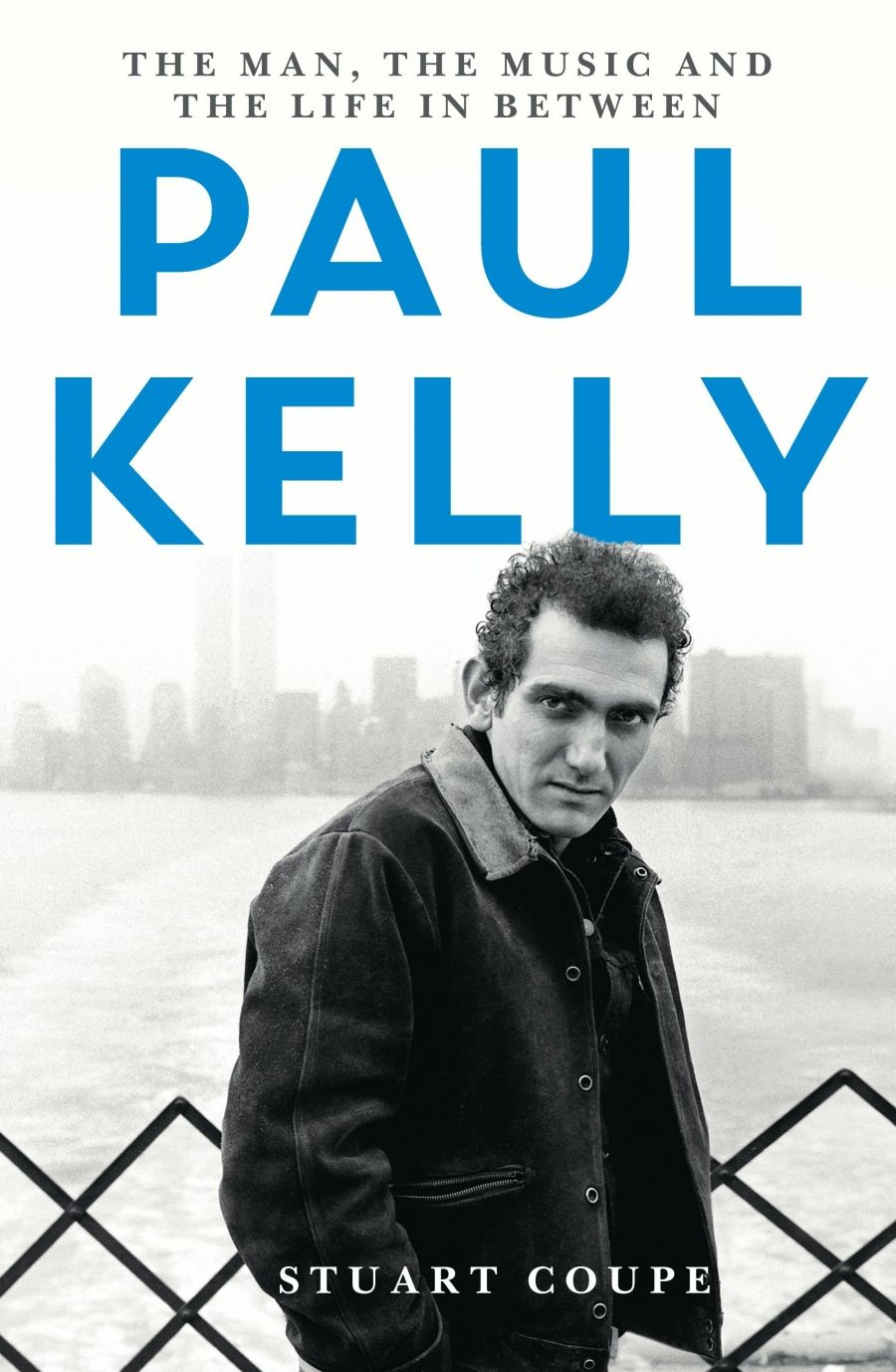
- Free Article: No
- Contents Category: Biography
- Review Article: Yes
- Online Only: No
- Custom Highlight Text:
The voice on the car radio was not immediately recognisable, nor was the song familiar to me. There was just a smoky laid-back piano and someone singing a song that sounded as though it was from the 1940s: ‘Young lovers, young lovers …’ I thought the voice, whomever it belonged to, had a real musicality in it, a precision of pitch and phrasing in tandem with a kind of liquid sweetness.
- Grid Image (300px * 250px):

- Book 1 Title: Paul Kelly
- Book 1 Subtitle: The man, the music and the life in-between
- Book 1 Biblio: Hachette Australia, $32.99 pb, 343 pp
- Book 1 Readings Link: booktopia.kh4ffx.net/569y1
The book tracks Kelly’s life and career from his birth, in 1950s Adelaide, into a ‘large, loving and educated Irish Catholic family’. His maternal grandparents had together formed the Italo Australian Grand Opera Company, which toured Australia in the 1920s; his grandfather was an Italian opera singer, a leading baritone for the La Scala Opera Company, whose wife became Australia’s first female symphony orchestra conductor. Near the end of the book, Coupe writes:
… as this book was well underway I joked with Paul … that he had explored so many musical genres that a jazz album couldn’t be far away as that was one musical genre he hadn’t ventured into.
As I said that a gentle smile appeared on Paul’s face and he said, ‘Well, it’s not exactly a jazz album but I did these shows with Paul Grabowsky and we’ve done a recording …’
‘Young Lovers’ appears on the album that Kelly made with Grabowsky, Please Leave Your Light On, a selection of Kelly’s songs rearranged by Grabowsky for piano and voice and released in July this year. For those of us who were listening in 1986 when Kelly had his first serious hit, ‘Before Too Long’, a collaboration with a legendary jazz pianist was not really where we thought he might end up in 2020.
 Paul Kelly presents The Merry Soul Sessions, 2015 (photograph by Bruce/Flickr)
Paul Kelly presents The Merry Soul Sessions, 2015 (photograph by Bruce/Flickr)
As Coupe’s book makes clear, collaboration is one of Kelly’s strengths. It’s an expression of his generosity to many other musicians, and it sometimes manifests in unexpected ways. The poetry-based song cycle ‘Thirteen Ways of Looking at Birds’, winner of a 2019 ARIA award and performed at the 2020 arts festivals in Adelaide and Perth, was developed and performed with classical pianist Anna Goldsworthy and her fellow members of the Seraphim Trio, as well as composer James Ledger and singer Alice Keath. Other completed projects over the past year have included the publication of a rich and reader-friendly anthology of poetry chosen and arranged by him, and a quietly shocking music video about the destruction of our environment, produced in collaboration with his partner, Siân Darling.
Coupe began thinking about this book five or six years ago, but 2020 seems a good year for it to be published, with Kelly highly visible and doing exciting work. Coupe is an author, publicist, and broadcaster whose professional life has been spent in the Australian popular music industry. He has known Kelly since 1976, was his manager for much of the 1980s, and spent many recent hours in his company gathering material for this book. This longstanding insider status and Coupe’s active presence in part of Kelly’s story have both advantages and disadvantages. The advantages include the knowledge of and access to many industry people and musicians and their testimony and reminiscences: ‘My plan … has been to give voice to all the creative individuals who have been part of Paul’s musical world, been there for the demos, recordings and live performances. The people who know what it’s like to be around Paul.’ Some of those people have confronting things to say, but to Coupe’s credit the book is neither hatchet job nor hagiography. Kelly is so complex a subject that it could easily have been either.
One of the disadvantages of Coupe’s insider status, at least for some readers, is the emphasis on the technical details of record production, and on the historical details of Kelly’s bandmates and business arrangements: good (or bad) reviews, record sales and labels, which musicians joined and left under what circumstances, and how everyone felt about it. The sex and drugs that traditionally go with rock and roll also get plenty of attention. But the reader sometimes wonders exactly who Coupe is writing for, and most of the Kelly fans likely to buy and read this book might feel a certain lack of detailed, concrete attention to his lyrics, or to the rhythms and feel of his music. Coupe rarely digs right down into things like chord progressions, musical forms and genres, or lyric dexterity.
But there are some intriguing comments directly from Kelly about the songwriting process itself. And near the end of the book, the veteran music journalist David Fricke sums up the main reason why Kelly’s songs have resonated so strongly with so many people for so long: of the classic ‘How To Make Gravy’, Fricke says, ‘It’s not so much a song about Christmas as it is a song about longing.’ Beginning with one specific, concrete image or situation, Kelly’s best songs spread out across a broad field of meaning and human experience. ‘They got married early, never had no money.’ ‘Grandfather walked this land in chains.’ ‘Hello Dan, it’s Joe here, I hope you’re keeping well.’


Comments powered by CComment